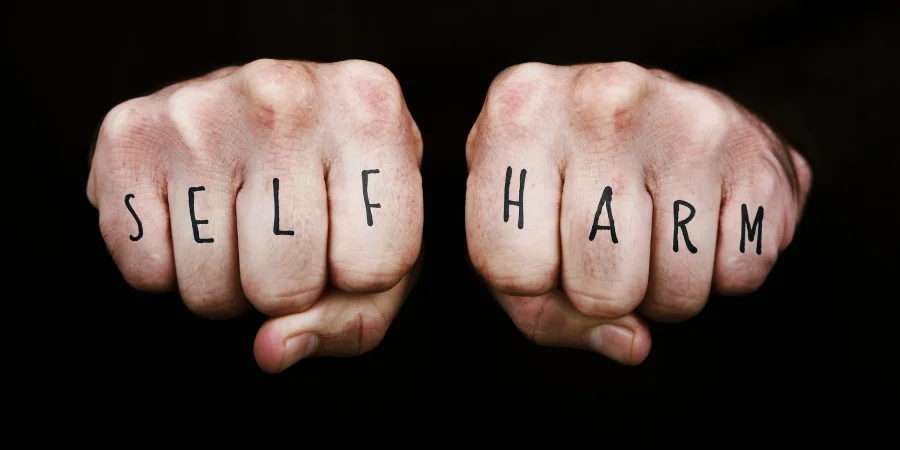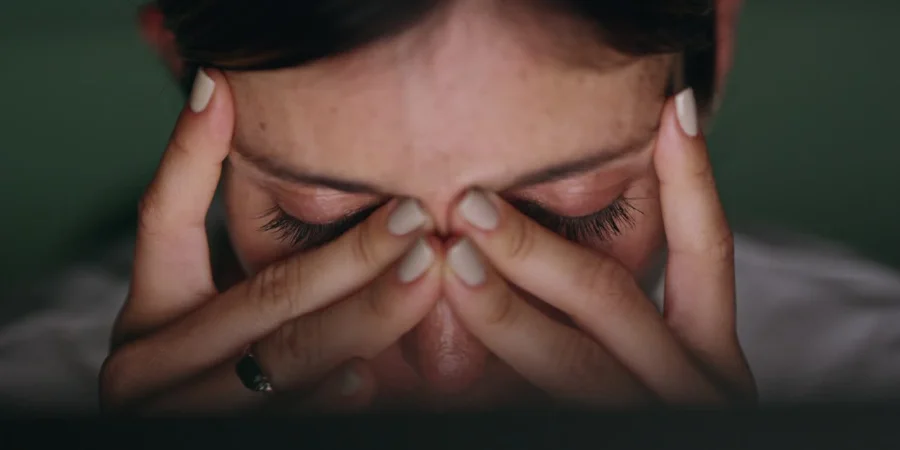Last Updated:
August 7th, 2025
Self-Harm and Addiction | Symptoms and Treatment
Mental health conditions are usually invisible, with outsiders unable to see the emotional pain experienced by the person suffering. Self-harm, however, is unique in this way, with this pain made more noticeable and easier to identify. As self-harm is often misunderstood, this can make it especially uncomfortable for those struggling to disclose their distress to others, free from judgement.
According to recent studies, adolescents are more at risk of self-harm and addictive behaviours than any other age group, with 24% of seventeen-year-olds reporting having self-harmed in the previous year. When you think about just how many cases go unreported, the extent of the problem becomes all too clear.
It is common for incidences of self-harm to be accompanied by other conditions, like addiction and depression. When we struggle with two of these simultaneously, it is referred to as a co-occurring disorder. For more information about self-harm and addiction, as well as how to identify and approach the situation if you or a loved one is suffering, read on for more information.

What is self-harm?
Self-harm refers to a behaviour where individuals will intentionally injure themselves, usually as an outlet to manage painful memories or cope with overwhelming emotions. Everyone will have different reasons for self-harming, and it is impossible to provide just one explanation for this affliction. However, some reasons that people might turn to self-harm can include the following:
- To cope with unresolved trauma
- To feel ‘in control.’
- A way to punish themselves
- To provide a distraction
- A way to feel something
Many individuals assume that self-harm is exclusive to cutting; however, there are varying methods used to self-harm, which can involve:
- Burning the skin
- Pulling at the hair
- Deliberate starvation
- Head banging or hitting
- Self-poisoning
- Scratching the skin
Why do addiction and self-harm go hand in hand?
Addiction is a condition that can present itself either through substances or behaviours, with a person becoming so reliant on their habit that the world around them begins to change, leaving them feeling powerless and unable to control it. Fortunately, addiction is a very treatable condition, and through regular support and guidance, this illness can be overcome.
Research shows that self-harm shares many similarities with addictive behaviours. In fact, self-harm is itself characterised as an addiction by many medical professionals. This is because the action of intentionally harming yourself can be compulsive and used as a coping mechanism to manage emotional pain. Eventually, those who self-harm can become totally reliant on this behaviour, almost as a crutch to cope with past experiences or problems. Addiction, too, can arise for similar reasons, with those who are suffering from the condition frequently taking part in activities (like chronic alcoholism or substance abuse) to escape uncomfortable thoughts or feelings of distress.
In much the same way, addiction can be compared to self-harm, as those who, for example, ingest dangerous chemicals in excess are deliberately harming themselves, relying on unhealthy coping strategies to manage their suffering. Some symptoms of self-harm that are also applicable to addiction include:
- Relying on the behaviour to help cope with life and its challenges.
- Regularly using the behaviour to feel less overwhelmed.
- To gain a sense of temporary relief from troubling thoughts or feelings.
- Using the behaviour as a distraction from the real world.

Much like addiction, self-harm offers a short-term solution to long-term problems. Unfortunately, however, these behaviours rarely offer any more than a temporary reprieve, and the problems will only return after the behaviour ceases. Therefore, if you are relying on self-harm or addictive substances, it is vital that you engage with treatment right away and get the help that you deserve.
Things not to say to someone who self-harms or struggles with addiction
As both self-harm and many forms of addiction are physical responses to psychological problems, many of us overlook the realities of the affliction. While it might not be the intent, these misconceptions often result in harmful reactions, with loved ones trying to make the behaviour stop instead of seeking to understand the reasons behind it.
It is so essential that both self-harm and addiction are treated in the same way as any other condition and that they are taken just as seriously. We must remember that it is never as simple as quitting the behaviour, and these conditions take a great deal of strength and support to overcome. Below, we outline some of the things not to say to someone struggling, either with self-harm or addiction:
Self-harm and addiction are just attention seeking…
For those who do not understand self-harm, the thought of someone deliberately damaging their body with physical scars and wounds might appear like an attempt to be noticed by others or receive a reaction from those around them. However, it is important to remember that this is often not the case, in fact, quite the opposite.
Both addiction and self-harm can offer an outlet for sufferers to cope with painful experiences or distressing emotions, and it can sometimes feel like the only escape in difficult times. So, labelling a loved one’s dangerous behaviour as ‘attention seeking’ will only push them away, making it less likely for them to share their feelings with you in future.
In fact, incidences of self-harm are often a sign that an individual could be suffering from an underlying problem or mental health condition such as depression, addiction, or anxiety, for example. With this in mind, it is essential that we care for our loved ones, looking beyond our assumptions and approaching them with compassion and kindness.
If you are unsure about how to approach a loved one who is struggling with self-harm or addiction, look to the table below:
| If you… | Try instead to… |
|---|---|
| Dismiss your loved one’s feelings. | Acknowledge their emotions and talk to them with compassion. |
| Judge their behaviour or respond with angry outbursts. | Recognise that your loved one is suffering and show them that you care. |
| Ambush them with questions about their behaviour. | Plan a time to talk, and do not force the conversation if they are not up to it. |
People who self-harm are overreacting to common problems…
Self-harm and addiction both carry with them a big stigma. This means that, for those who do not understand what it means to have, many assume it is easily fixable, simply through stopping the behaviour or learning to “deal with things” better. However, statements like the above really take away from the weight of what the person is suffering and will make it even more difficult for them to seek help if they are in distress.
Treating self-harm and addiction
The treatment most suited to meet your needs will be dependent on individual circumstances, and it is essential that you first determine whether self-harm or addiction is your primary condition. Even for those with multiple addictions, there is always one illness which triggers the others, and to find the most effective treatment plan for you it is essential you determine this fact before entering one of our centres. For example, if you feel that your self-harm is causing your other issues with addiction to occur, this will make self-harm your primary addiction, and it might be necessary to seek help for this prior to entering our facility.
However, as both addiction and self-harm are closely linked, many therapeutic interventions we include at our facility are widely transferrable for treating self-harm. In fact, treating addiction as a primary condition can still be very valuable to treating the co-occurring disorder on the whole.
Some of our many therapies can be invaluable to those struggling with self-harm or addiction, some of which include:
- Art TherapyThis form of therapy is a wonderful resource for those who are struggling with self-harm and addiction, as it offers a unique way to express complex emotions without having to do so verbally.
- Cognitive Behavioural Therapy (CBT)Both addiction and self-harm can arise as a result of unhealthy coping strategies, using these behaviours to manage troubling thoughts or emotions. CBT enables clients to shift their perspective, changing the way that they see and react to the world around them.
- MeditationSometimes, the world can seem pretty non-stop, with all the distractions leaving us overwhelmed. However, through meditation, individuals can learn to find comfort from within, looking inward for calm and focus instead of turning to external influences.

Give us a call today
If you are someone who is self-harming, as well as exhibiting signs of addiction, we understand just how painful it can be to seek help and disclose to those around you that you have a co-occurring disorder. You might feel judged, misunderstood, or simply afraid to take that first step toward healing and recovery. However, at Primrose Lodge, we have worked tirelessly to cultivate an environment of care and understanding, ensuring that, whatever your challenges, you will be welcomed into our community with nothing but compassion and support.
If you would like any more information about our facility, and all the treatments we have available to assist you in your addiction recovery, do not hesitate to call a member of staff right away.

